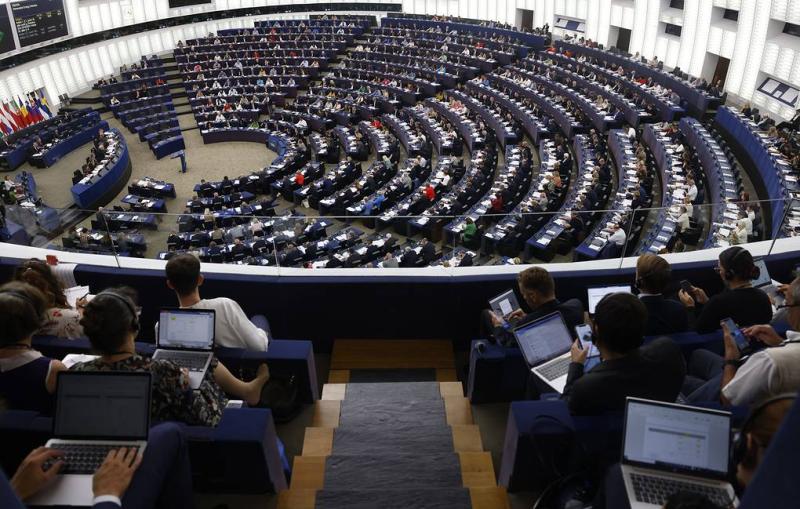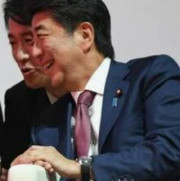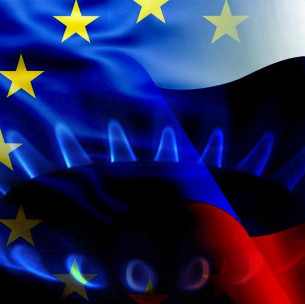
© AP Photo/Jean-Francois Badias/TASS
Top stories from the Russian press on Wednesday, November 2nd, prepared by TASS
Izvestia: EU eyes its own costly ‘Marshall Plan’ for restoring Ukraine
The EU is debating whether or not to include frozen Russian assets in its strategy to revive the Ukrainian economy, a source in the European Parliament told Izvestia. The idea of creating a new "Marshall Plan" was proposed at the end of October at a conference in Berlin on restoring Ukraine. So far, the EU is focusing on the World Bank’s estimates of the damage at 345 bln euro, although Kiev insists on a figure of 750 bln euro. According to experts interviewed by Izvestia, Europe has a lot of work ahead, including legal concerns, particularly if they attempt to use Russian assets in the mechanism, which Moscow has frequently referred to as theft.
A source familiar with the situation told Izvestia that the idea of a new "Marshall Plan" is primarily associated with the status of Ukraine as a candidate for EU membership.
Meanwhile, Member of the European Parliament from Germany Gunnar Beck told Izvestia that the proposed plan would most likely be able to come into force only after the end of hostilities. Moreover, this would pose an economic threat to the bloc itself, he believes. According to him, the final amount of aid could soar to 1 trillion euro. It is planned that all countries of the association will participate in it, and Germany would pay at least a quarter of the amount, he stressed.
Kiev also insists on using frozen Russian assets in the plan, Izvestia writes. Nevertheless, Beck noted that such a possibility is discussed with restraint in the EU.
Director of the Center for European Information, Associate Professor at MGIMO Nikolay Topornin suggests that it is unlikely that frozen Russian assets could be used in the new Marshall Plan. "There are many difficult moments related to the status of this money and the legitimacy of its withdrawal from Russia. Rather, it should not be ruled out that Russia itself will be involved in the restoration of the Ukrainian economy," he told Izvestia. Topornin noted that by talking about a new "Marshall Plan" Europe is now also trying to solve an ideological problem.
Kommersant: US running out of time to set price caps on Russian oil imports
The United States is allowed to continue dealing with Russian oil until January 19, 2023. Initially, the US and the EU were going to introduce a price cap starting from December 5, but just a month before this date, the parameters of this mechanism remain unknown. Analysts told Kommersant the concept of a price ceiling was initially ambiguous, and without clarification of the conditions under which it would operate, the policy would be meaningless.
The Biden administration's position on setting a price cap began to change significantly after OPEC+ decided to embark on a 2-mln barrel per day production cut from November. In this way, Saudi Arabia made it clear that it will not compensate for the possible loss of Russian volumes, Kommersant writes.
If the price cap is implemented, the market would experience a shortage, and oil prices will exceed $100 per barrel, forcing the US to reevaluate the scope of this action, Maria Belova from Vygon Consulting believes. The expert pointed out that there are channels for barter transactions and settlements in national currencies, thus the issue of the cap's effectiveness is still up for debate.
There will be numerous ways to re-export oil to neighboring nations like Turkey as well as other ways to get around the regulations, Deputy Head of the economic department at the Institute of Energy and Finance Sergey Kondratyev believes.
The oil price cap is experimental, and adjustments will be made in real time based on market feedback, Igor Galaktionov from BCS World of Investments noted. According to him, the ongoing sanctions greatly raise the possibility of supply disruptions and may trigger another price hike.
Kommersant: IAEA goes to Ukraine in search of ‘dirty bomb’ evidence
Inspectors from the International Atomic Energy Agency (IAEA) arrived in Ukraine looking for traces of a "dirty bomb", which Russia had previously warned the Kiev regime was planning to use. Ukraine, in turn, accused Moscow of spreading disinformation and invited IAEA experts to inspect the facilities under suspicion. The agency promised to announce the mission’s results in the coming days. However, whatever the experts’ conclusions might be, the "dirty bomb" story is unlikely to end there, Kommersant writes.
The Ukrainians sent an invitation to the organization immediately after Moscow's statements about Kiev’s plans to create and use a "dirty bomb". Agency experts will have to inspect two sites - the Eastern Mining and Processing Plant, as well as the Kiev Institute for Nuclear Research. According to Moscow, these structures that have been tasked with creating this "dirty bomb". The IAEA may present its initial findings by the end of the week.
In the meantime, the Russian authorities also supported the idea of having international inspectors visit the Ukrainian facilities. According to the newspaper, it may be inferred from a number of comments that Russia might not be pleased with the inspection of just two Ukrainian facilities. Earlier, Russia’s Permanent Representative to the UN Vasily Nebenzia said that Ukraine could work on creating a "dirty bomb" not only at those facilities that IAEA experts plan to inspect. "So even if the IAEA inspectors don’t find anything suspicious either in Kiev or in Zheltye Vody, the story of the ‘dirty bomb’ is unlikely to end there," Kommersant writes.
Nezavisimaya Gazeta: NATO pressuring Sweden to yield to Turkish demands
NATO is putting pressure on the government of Sweden, urging it to submit to Turkey, who put forward a list of demands to the Nordic states that wished to join the bloc. In a week, incoming Swedish Prime Minister Ulf Kristersson is expected to visit Ankara and discuss the country's NATO membership bid issue. Officials familiar with the discussions told Nezavisimaya Gazeta that President Recep Tayyip Erdogan is unlikely to give up his demands.
The US-led military bloc is trying to get the Scandinavian country to soften up its tough human rights stance, Al-Monitor writes. Turkey also demanded that Sweden and Finland ditch supporting Kurdish left-wing radicals and extradite dissidents who are in hiding.
Western observers believe that Ankara is likely to move forward with the consideration of Helsinki's application, but will slow down Stockholm, which seems logical right before Turkey's 2023 general election, in which anti-Western rhetoric is an important attribute, Al-Monitor sources say.
Meanwhile, the upcoming talks this month between Ankara and Stockholm will overlap with Turkey’s increasing role in the "grain deal". However, some experts believe this would not influence the talks. "Ankara initially associated the membership of Stockholm and Helsinki with the issue of supporting the Kurdistan Workers' Party. Disagreements on this issue appeared long before the conflict in Ukraine," Director of the Center for Modern Turkish Studies Yury Mavashev told Nezavisimaya Gazeta.
Vedomosti: Russia looks into local SWIFT alternatives
The Russian government is developing a new mechanism for settlements with counterparties from one of the friendly countries, a federal official told Vedomosti. The information was confirmed by a source close to the government. The new system will be based on interconnecting the "Russian SWIFT", the Financial Messaging System of the Bank of Russia (SPFS) of the Bank of Russia, and its national counterparts in other states.
"This idea is still at an early stage. It is not simple, but we raise this issue with our colleagues. This is not so much an alternative to SWIFT, but a possible system that would enable working with national currencies," the source told the newspaper.
The majority of the countries in the SCO have their own internal financial messaging systems, so they all have the foundation for creating an integrated system, Chairman of the Board of the National Payments Council Alma Obayeva told the newspaper. According to her, a number of countries, including Russia, used SWIFT instead of developing their own national systems because it was more profitable and convenient due to low fees and technical advantages. After disconnection from SWIFT, the country can develop its own system, she believes.
The combined system can become a full-fledged analogue of SWIFT over time, when the number of its participants approaches the number of counterparties of the international system, junior director for credit institution ratings at Expert RA Vyacheslav Putilovsky said. It could become a backup system for banks from SCO countries, he added.









